An Analysis of Ethical Challenges in Marriott's Reward Management
VerifiedAdded on 2019/12/04
|13
|4095
|91
Report
AI Summary
This report delves into the ethical dilemmas faced by Marriott Hotel in its reward management practices. It identifies key ethical problems such as managerial bias, discrimination based on gender and race, and the creation of wage gaps due to subjective evaluation methods. The report examines the consequences of these issues, including demotivation, decreased employee morale, and damage to the company's ethical image. It critically evaluates HRM and ethical methods for addressing these problems, proposing solutions like management by objectives and benchmarking to ensure fair and transparent reward distribution. The report concludes with recommendations for Marriott to adopt a more ethical approach to reward management, fostering a positive and productive work environment. The report emphasizes the importance of fairness, transparency, and objective performance evaluation in maintaining employee motivation and organizational integrity.
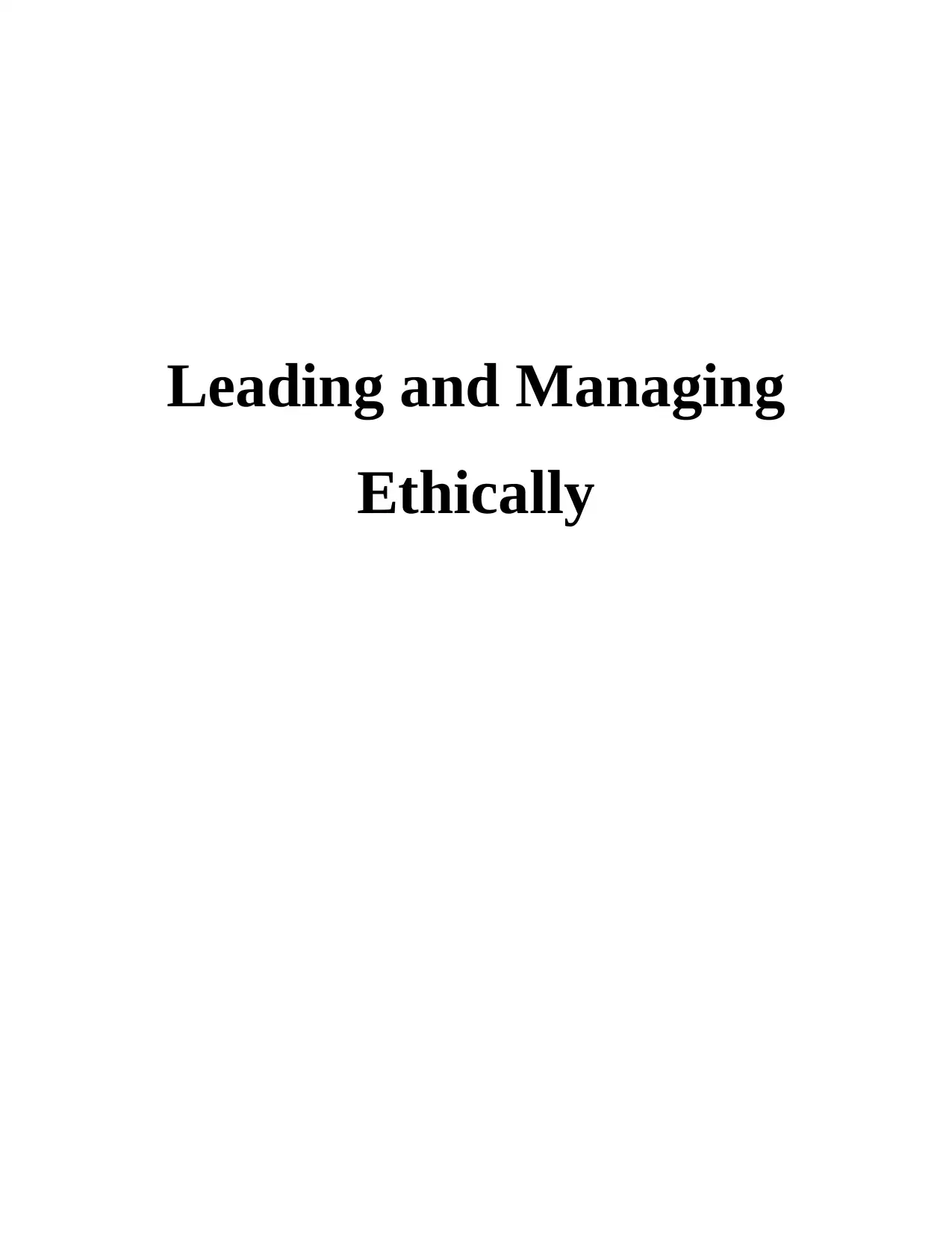
Leading and Managing
Ethically
Ethically
Paraphrase This Document
Need a fresh take? Get an instant paraphrase of this document with our AI Paraphraser
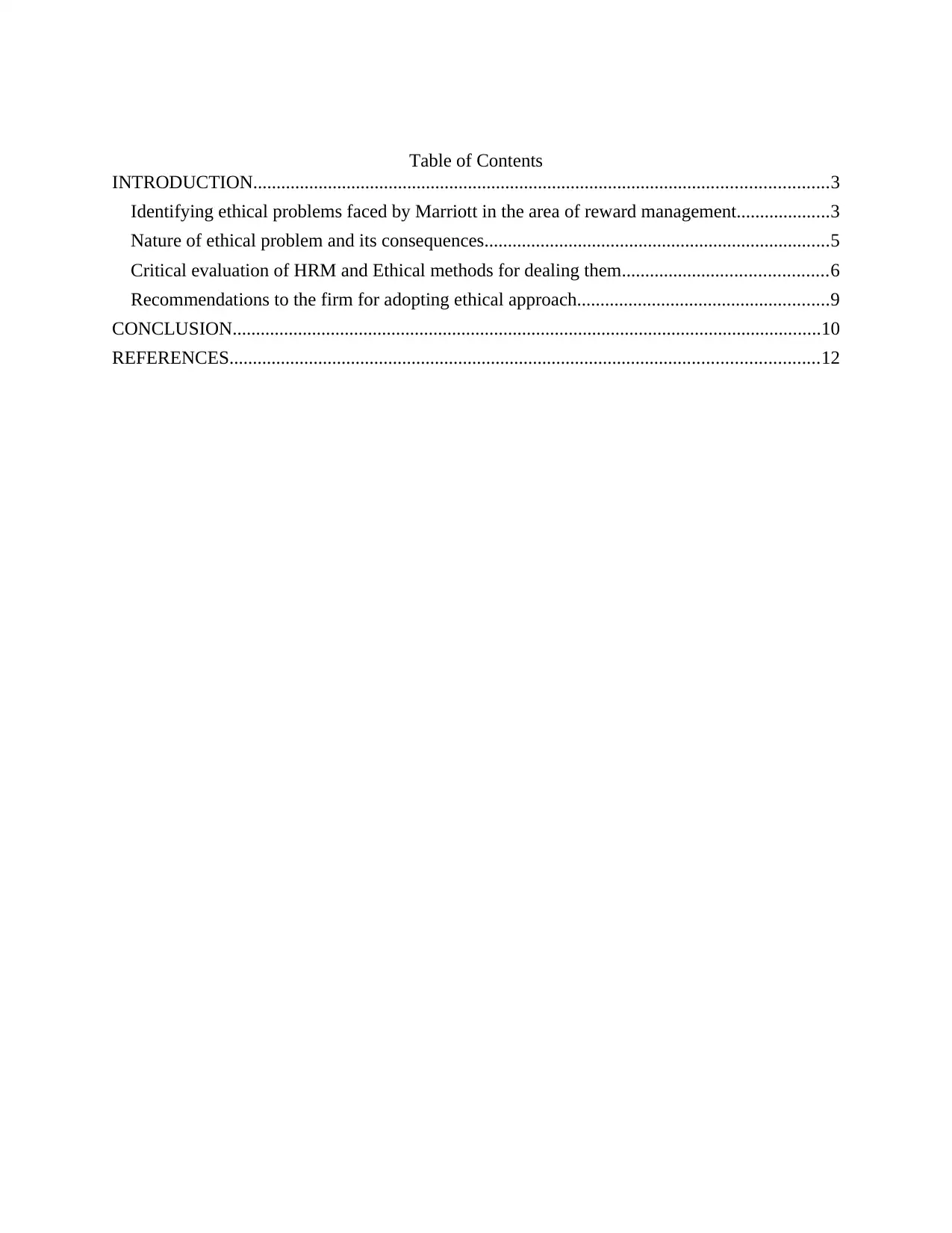
Table of Contents
INTRODUCTION...........................................................................................................................3
Identifying ethical problems faced by Marriott in the area of reward management....................3
Nature of ethical problem and its consequences..........................................................................5
Critical evaluation of HRM and Ethical methods for dealing them............................................6
Recommendations to the firm for adopting ethical approach......................................................9
CONCLUSION..............................................................................................................................10
REFERENCES..............................................................................................................................12
INTRODUCTION...........................................................................................................................3
Identifying ethical problems faced by Marriott in the area of reward management....................3
Nature of ethical problem and its consequences..........................................................................5
Critical evaluation of HRM and Ethical methods for dealing them............................................6
Recommendations to the firm for adopting ethical approach......................................................9
CONCLUSION..............................................................................................................................10
REFERENCES..............................................................................................................................12
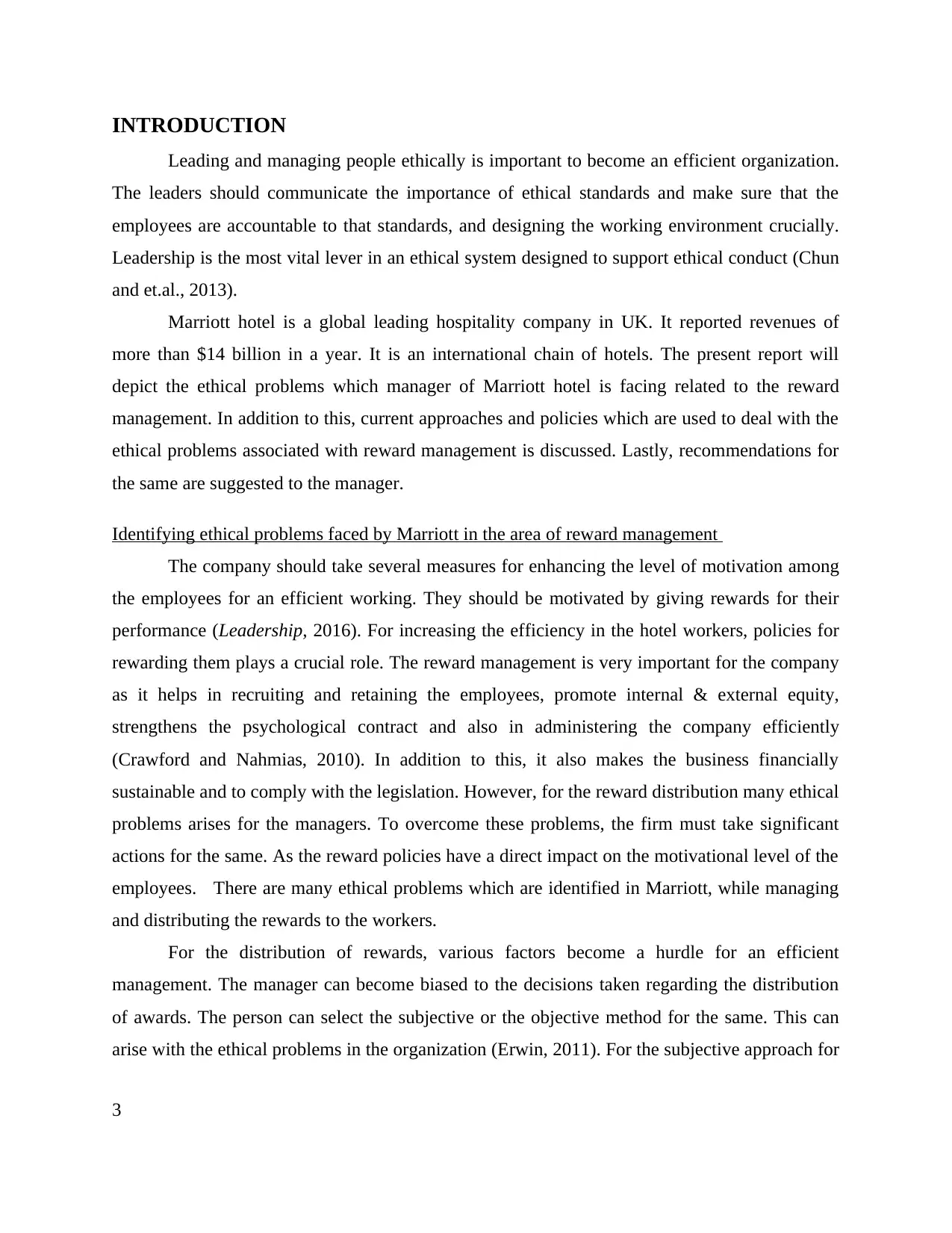
INTRODUCTION
Leading and managing people ethically is important to become an efficient organization.
The leaders should communicate the importance of ethical standards and make sure that the
employees are accountable to that standards, and designing the working environment crucially.
Leadership is the most vital lever in an ethical system designed to support ethical conduct (Chun
and et.al., 2013).
Marriott hotel is a global leading hospitality company in UK. It reported revenues of
more than $14 billion in a year. It is an international chain of hotels. The present report will
depict the ethical problems which manager of Marriott hotel is facing related to the reward
management. In addition to this, current approaches and policies which are used to deal with the
ethical problems associated with reward management is discussed. Lastly, recommendations for
the same are suggested to the manager.
Identifying ethical problems faced by Marriott in the area of reward management
The company should take several measures for enhancing the level of motivation among
the employees for an efficient working. They should be motivated by giving rewards for their
performance (Leadership, 2016). For increasing the efficiency in the hotel workers, policies for
rewarding them plays a crucial role. The reward management is very important for the company
as it helps in recruiting and retaining the employees, promote internal & external equity,
strengthens the psychological contract and also in administering the company efficiently
(Crawford and Nahmias, 2010). In addition to this, it also makes the business financially
sustainable and to comply with the legislation. However, for the reward distribution many ethical
problems arises for the managers. To overcome these problems, the firm must take significant
actions for the same. As the reward policies have a direct impact on the motivational level of the
employees. There are many ethical problems which are identified in Marriott, while managing
and distributing the rewards to the workers.
For the distribution of rewards, various factors become a hurdle for an efficient
management. The manager can become biased to the decisions taken regarding the distribution
of awards. The person can select the subjective or the objective method for the same. This can
arise with the ethical problems in the organization (Erwin, 2011). For the subjective approach for
3
Leading and managing people ethically is important to become an efficient organization.
The leaders should communicate the importance of ethical standards and make sure that the
employees are accountable to that standards, and designing the working environment crucially.
Leadership is the most vital lever in an ethical system designed to support ethical conduct (Chun
and et.al., 2013).
Marriott hotel is a global leading hospitality company in UK. It reported revenues of
more than $14 billion in a year. It is an international chain of hotels. The present report will
depict the ethical problems which manager of Marriott hotel is facing related to the reward
management. In addition to this, current approaches and policies which are used to deal with the
ethical problems associated with reward management is discussed. Lastly, recommendations for
the same are suggested to the manager.
Identifying ethical problems faced by Marriott in the area of reward management
The company should take several measures for enhancing the level of motivation among
the employees for an efficient working. They should be motivated by giving rewards for their
performance (Leadership, 2016). For increasing the efficiency in the hotel workers, policies for
rewarding them plays a crucial role. The reward management is very important for the company
as it helps in recruiting and retaining the employees, promote internal & external equity,
strengthens the psychological contract and also in administering the company efficiently
(Crawford and Nahmias, 2010). In addition to this, it also makes the business financially
sustainable and to comply with the legislation. However, for the reward distribution many ethical
problems arises for the managers. To overcome these problems, the firm must take significant
actions for the same. As the reward policies have a direct impact on the motivational level of the
employees. There are many ethical problems which are identified in Marriott, while managing
and distributing the rewards to the workers.
For the distribution of rewards, various factors become a hurdle for an efficient
management. The manager can become biased to the decisions taken regarding the distribution
of awards. The person can select the subjective or the objective method for the same. This can
arise with the ethical problems in the organization (Erwin, 2011). For the subjective approach for
3
⊘ This is a preview!⊘
Do you want full access?
Subscribe today to unlock all pages.

Trusted by 1+ million students worldwide
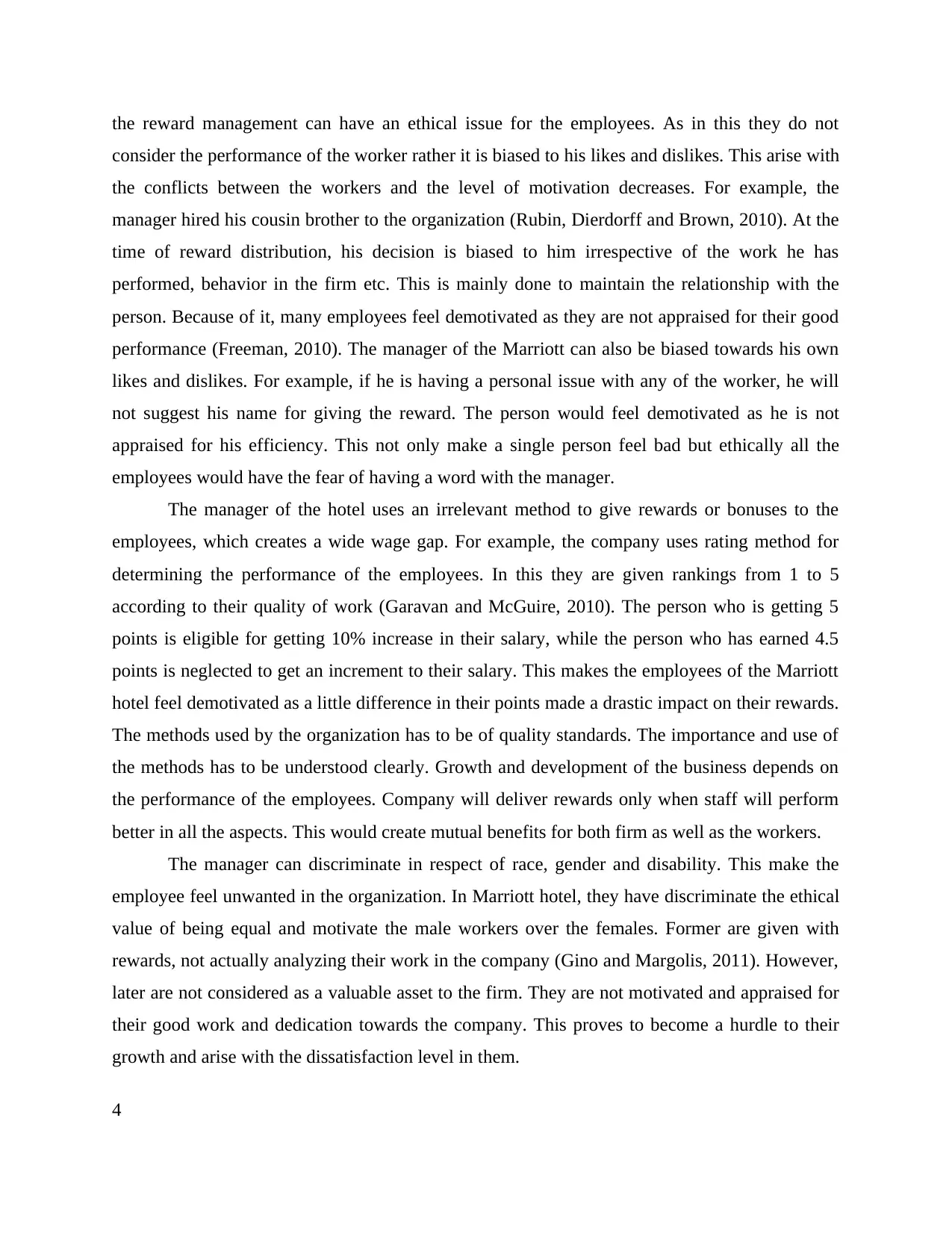
the reward management can have an ethical issue for the employees. As in this they do not
consider the performance of the worker rather it is biased to his likes and dislikes. This arise with
the conflicts between the workers and the level of motivation decreases. For example, the
manager hired his cousin brother to the organization (Rubin, Dierdorff and Brown, 2010). At the
time of reward distribution, his decision is biased to him irrespective of the work he has
performed, behavior in the firm etc. This is mainly done to maintain the relationship with the
person. Because of it, many employees feel demotivated as they are not appraised for their good
performance (Freeman, 2010). The manager of the Marriott can also be biased towards his own
likes and dislikes. For example, if he is having a personal issue with any of the worker, he will
not suggest his name for giving the reward. The person would feel demotivated as he is not
appraised for his efficiency. This not only make a single person feel bad but ethically all the
employees would have the fear of having a word with the manager.
The manager of the hotel uses an irrelevant method to give rewards or bonuses to the
employees, which creates a wide wage gap. For example, the company uses rating method for
determining the performance of the employees. In this they are given rankings from 1 to 5
according to their quality of work (Garavan and McGuire, 2010). The person who is getting 5
points is eligible for getting 10% increase in their salary, while the person who has earned 4.5
points is neglected to get an increment to their salary. This makes the employees of the Marriott
hotel feel demotivated as a little difference in their points made a drastic impact on their rewards.
The methods used by the organization has to be of quality standards. The importance and use of
the methods has to be understood clearly. Growth and development of the business depends on
the performance of the employees. Company will deliver rewards only when staff will perform
better in all the aspects. This would create mutual benefits for both firm as well as the workers.
The manager can discriminate in respect of race, gender and disability. This make the
employee feel unwanted in the organization. In Marriott hotel, they have discriminate the ethical
value of being equal and motivate the male workers over the females. Former are given with
rewards, not actually analyzing their work in the company (Gino and Margolis, 2011). However,
later are not considered as a valuable asset to the firm. They are not motivated and appraised for
their good work and dedication towards the company. This proves to become a hurdle to their
growth and arise with the dissatisfaction level in them.
4
consider the performance of the worker rather it is biased to his likes and dislikes. This arise with
the conflicts between the workers and the level of motivation decreases. For example, the
manager hired his cousin brother to the organization (Rubin, Dierdorff and Brown, 2010). At the
time of reward distribution, his decision is biased to him irrespective of the work he has
performed, behavior in the firm etc. This is mainly done to maintain the relationship with the
person. Because of it, many employees feel demotivated as they are not appraised for their good
performance (Freeman, 2010). The manager of the Marriott can also be biased towards his own
likes and dislikes. For example, if he is having a personal issue with any of the worker, he will
not suggest his name for giving the reward. The person would feel demotivated as he is not
appraised for his efficiency. This not only make a single person feel bad but ethically all the
employees would have the fear of having a word with the manager.
The manager of the hotel uses an irrelevant method to give rewards or bonuses to the
employees, which creates a wide wage gap. For example, the company uses rating method for
determining the performance of the employees. In this they are given rankings from 1 to 5
according to their quality of work (Garavan and McGuire, 2010). The person who is getting 5
points is eligible for getting 10% increase in their salary, while the person who has earned 4.5
points is neglected to get an increment to their salary. This makes the employees of the Marriott
hotel feel demotivated as a little difference in their points made a drastic impact on their rewards.
The methods used by the organization has to be of quality standards. The importance and use of
the methods has to be understood clearly. Growth and development of the business depends on
the performance of the employees. Company will deliver rewards only when staff will perform
better in all the aspects. This would create mutual benefits for both firm as well as the workers.
The manager can discriminate in respect of race, gender and disability. This make the
employee feel unwanted in the organization. In Marriott hotel, they have discriminate the ethical
value of being equal and motivate the male workers over the females. Former are given with
rewards, not actually analyzing their work in the company (Gino and Margolis, 2011). However,
later are not considered as a valuable asset to the firm. They are not motivated and appraised for
their good work and dedication towards the company. This proves to become a hurdle to their
growth and arise with the dissatisfaction level in them.
4
Paraphrase This Document
Need a fresh take? Get an instant paraphrase of this document with our AI Paraphraser
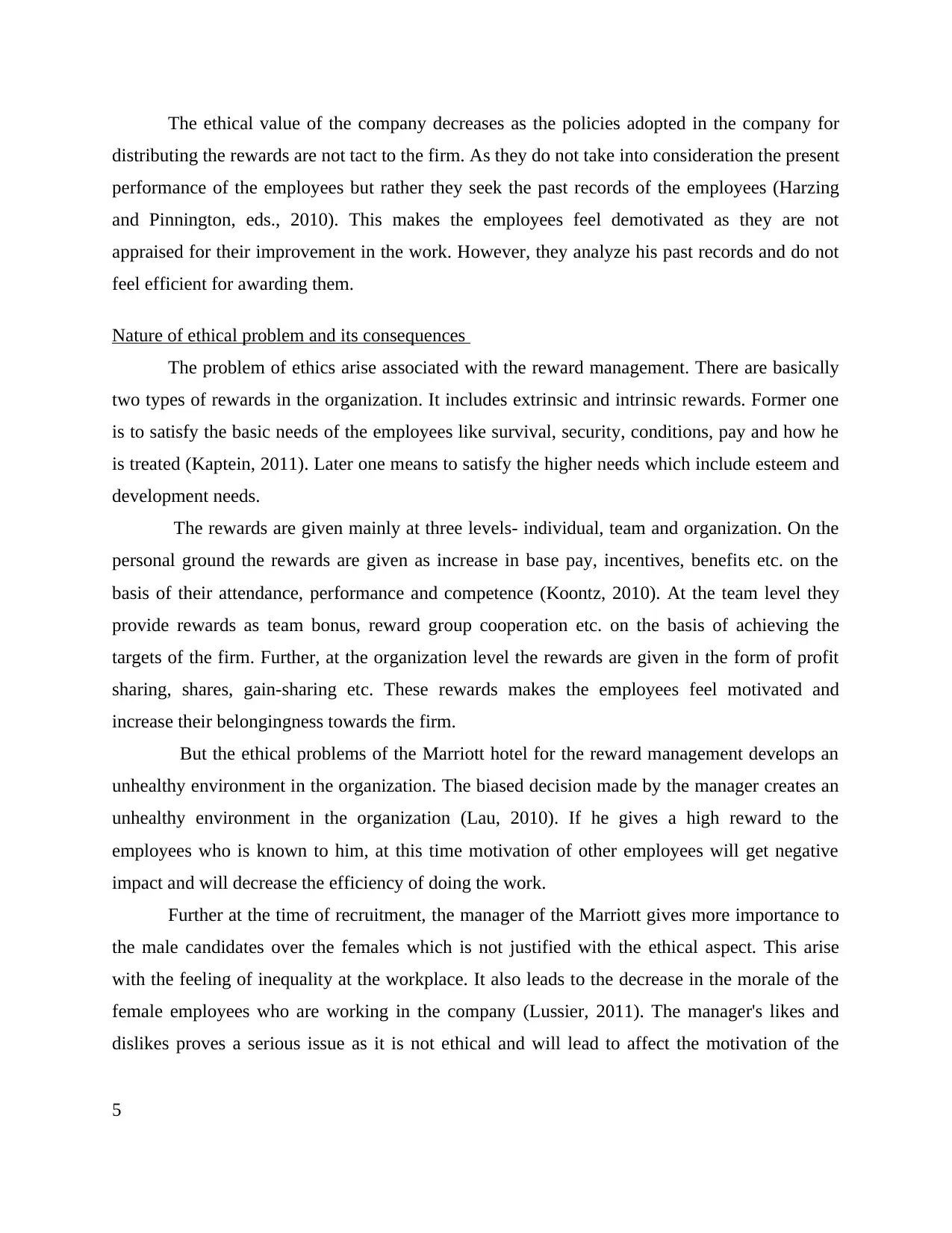
The ethical value of the company decreases as the policies adopted in the company for
distributing the rewards are not tact to the firm. As they do not take into consideration the present
performance of the employees but rather they seek the past records of the employees (Harzing
and Pinnington, eds., 2010). This makes the employees feel demotivated as they are not
appraised for their improvement in the work. However, they analyze his past records and do not
feel efficient for awarding them.
Nature of ethical problem and its consequences
The problem of ethics arise associated with the reward management. There are basically
two types of rewards in the organization. It includes extrinsic and intrinsic rewards. Former one
is to satisfy the basic needs of the employees like survival, security, conditions, pay and how he
is treated (Kaptein, 2011). Later one means to satisfy the higher needs which include esteem and
development needs.
The rewards are given mainly at three levels- individual, team and organization. On the
personal ground the rewards are given as increase in base pay, incentives, benefits etc. on the
basis of their attendance, performance and competence (Koontz, 2010). At the team level they
provide rewards as team bonus, reward group cooperation etc. on the basis of achieving the
targets of the firm. Further, at the organization level the rewards are given in the form of profit
sharing, shares, gain-sharing etc. These rewards makes the employees feel motivated and
increase their belongingness towards the firm.
But the ethical problems of the Marriott hotel for the reward management develops an
unhealthy environment in the organization. The biased decision made by the manager creates an
unhealthy environment in the organization (Lau, 2010). If he gives a high reward to the
employees who is known to him, at this time motivation of other employees will get negative
impact and will decrease the efficiency of doing the work.
Further at the time of recruitment, the manager of the Marriott gives more importance to
the male candidates over the females which is not justified with the ethical aspect. This arise
with the feeling of inequality at the workplace. It also leads to the decrease in the morale of the
female employees who are working in the company (Lussier, 2011). The manager's likes and
dislikes proves a serious issue as it is not ethical and will lead to affect the motivation of the
5
distributing the rewards are not tact to the firm. As they do not take into consideration the present
performance of the employees but rather they seek the past records of the employees (Harzing
and Pinnington, eds., 2010). This makes the employees feel demotivated as they are not
appraised for their improvement in the work. However, they analyze his past records and do not
feel efficient for awarding them.
Nature of ethical problem and its consequences
The problem of ethics arise associated with the reward management. There are basically
two types of rewards in the organization. It includes extrinsic and intrinsic rewards. Former one
is to satisfy the basic needs of the employees like survival, security, conditions, pay and how he
is treated (Kaptein, 2011). Later one means to satisfy the higher needs which include esteem and
development needs.
The rewards are given mainly at three levels- individual, team and organization. On the
personal ground the rewards are given as increase in base pay, incentives, benefits etc. on the
basis of their attendance, performance and competence (Koontz, 2010). At the team level they
provide rewards as team bonus, reward group cooperation etc. on the basis of achieving the
targets of the firm. Further, at the organization level the rewards are given in the form of profit
sharing, shares, gain-sharing etc. These rewards makes the employees feel motivated and
increase their belongingness towards the firm.
But the ethical problems of the Marriott hotel for the reward management develops an
unhealthy environment in the organization. The biased decision made by the manager creates an
unhealthy environment in the organization (Lau, 2010). If he gives a high reward to the
employees who is known to him, at this time motivation of other employees will get negative
impact and will decrease the efficiency of doing the work.
Further at the time of recruitment, the manager of the Marriott gives more importance to
the male candidates over the females which is not justified with the ethical aspect. This arise
with the feeling of inequality at the workplace. It also leads to the decrease in the morale of the
female employees who are working in the company (Lussier, 2011). The manager's likes and
dislikes proves a serious issue as it is not ethical and will lead to affect the motivation of the
5
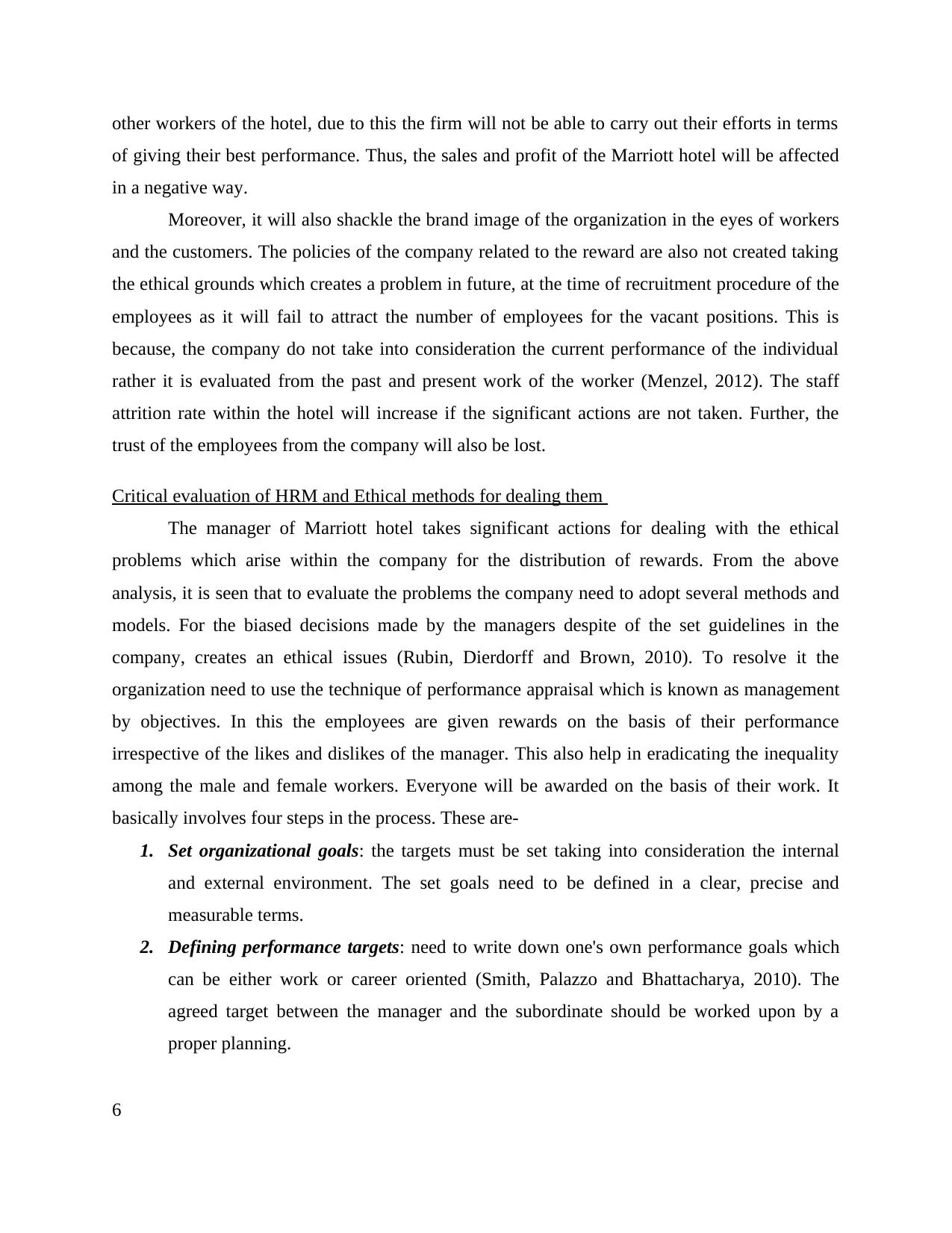
other workers of the hotel, due to this the firm will not be able to carry out their efforts in terms
of giving their best performance. Thus, the sales and profit of the Marriott hotel will be affected
in a negative way.
Moreover, it will also shackle the brand image of the organization in the eyes of workers
and the customers. The policies of the company related to the reward are also not created taking
the ethical grounds which creates a problem in future, at the time of recruitment procedure of the
employees as it will fail to attract the number of employees for the vacant positions. This is
because, the company do not take into consideration the current performance of the individual
rather it is evaluated from the past and present work of the worker (Menzel, 2012). The staff
attrition rate within the hotel will increase if the significant actions are not taken. Further, the
trust of the employees from the company will also be lost.
Critical evaluation of HRM and Ethical methods for dealing them
The manager of Marriott hotel takes significant actions for dealing with the ethical
problems which arise within the company for the distribution of rewards. From the above
analysis, it is seen that to evaluate the problems the company need to adopt several methods and
models. For the biased decisions made by the managers despite of the set guidelines in the
company, creates an ethical issues (Rubin, Dierdorff and Brown, 2010). To resolve it the
organization need to use the technique of performance appraisal which is known as management
by objectives. In this the employees are given rewards on the basis of their performance
irrespective of the likes and dislikes of the manager. This also help in eradicating the inequality
among the male and female workers. Everyone will be awarded on the basis of their work. It
basically involves four steps in the process. These are-
1. Set organizational goals: the targets must be set taking into consideration the internal
and external environment. The set goals need to be defined in a clear, precise and
measurable terms.
2. Defining performance targets: need to write down one's own performance goals which
can be either work or career oriented (Smith, Palazzo and Bhattacharya, 2010). The
agreed target between the manager and the subordinate should be worked upon by a
proper planning.
6
of giving their best performance. Thus, the sales and profit of the Marriott hotel will be affected
in a negative way.
Moreover, it will also shackle the brand image of the organization in the eyes of workers
and the customers. The policies of the company related to the reward are also not created taking
the ethical grounds which creates a problem in future, at the time of recruitment procedure of the
employees as it will fail to attract the number of employees for the vacant positions. This is
because, the company do not take into consideration the current performance of the individual
rather it is evaluated from the past and present work of the worker (Menzel, 2012). The staff
attrition rate within the hotel will increase if the significant actions are not taken. Further, the
trust of the employees from the company will also be lost.
Critical evaluation of HRM and Ethical methods for dealing them
The manager of Marriott hotel takes significant actions for dealing with the ethical
problems which arise within the company for the distribution of rewards. From the above
analysis, it is seen that to evaluate the problems the company need to adopt several methods and
models. For the biased decisions made by the managers despite of the set guidelines in the
company, creates an ethical issues (Rubin, Dierdorff and Brown, 2010). To resolve it the
organization need to use the technique of performance appraisal which is known as management
by objectives. In this the employees are given rewards on the basis of their performance
irrespective of the likes and dislikes of the manager. This also help in eradicating the inequality
among the male and female workers. Everyone will be awarded on the basis of their work. It
basically involves four steps in the process. These are-
1. Set organizational goals: the targets must be set taking into consideration the internal
and external environment. The set goals need to be defined in a clear, precise and
measurable terms.
2. Defining performance targets: need to write down one's own performance goals which
can be either work or career oriented (Smith, Palazzo and Bhattacharya, 2010). The
agreed target between the manager and the subordinate should be worked upon by a
proper planning.
6
⊘ This is a preview!⊘
Do you want full access?
Subscribe today to unlock all pages.

Trusted by 1+ million students worldwide
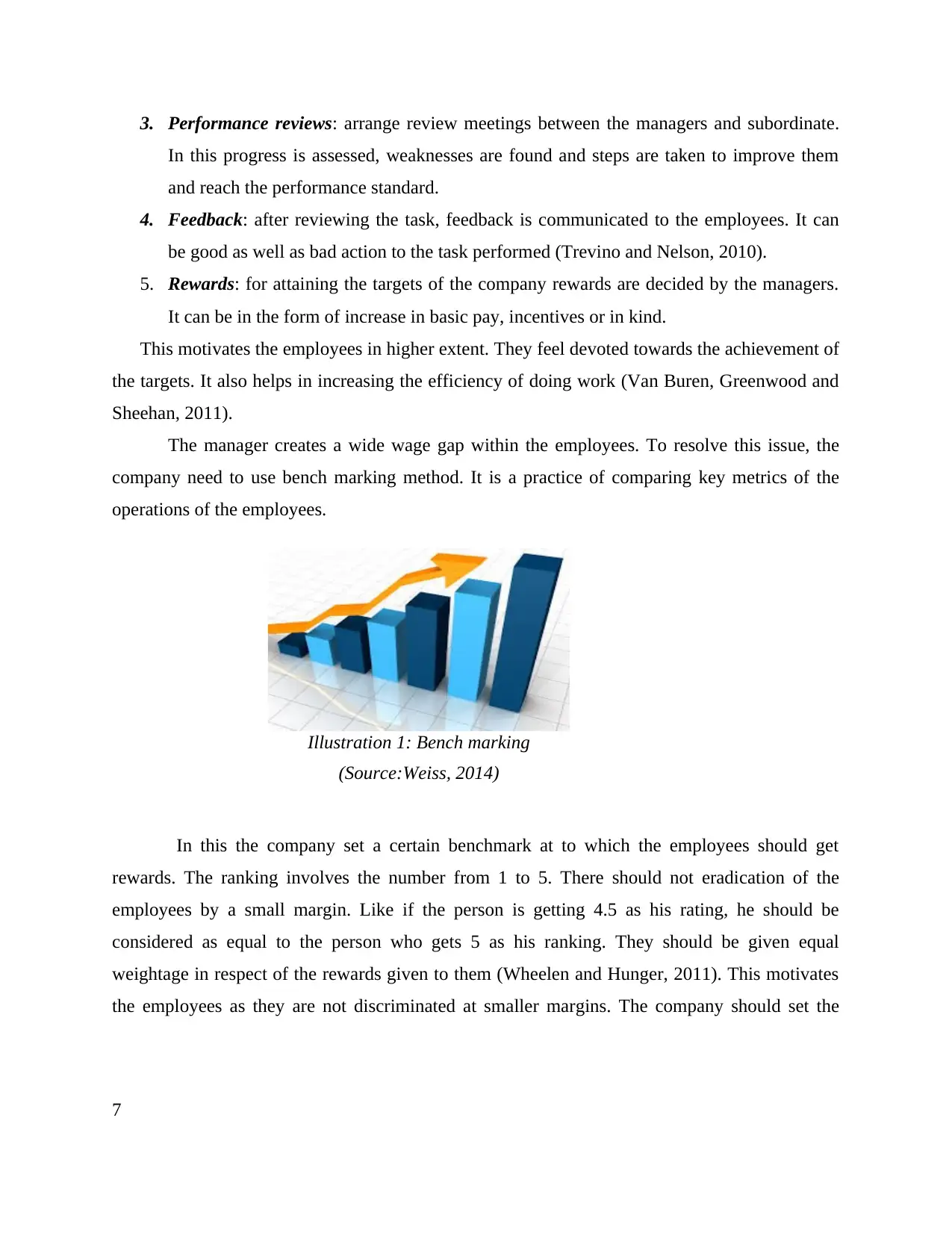
3. Performance reviews: arrange review meetings between the managers and subordinate.
In this progress is assessed, weaknesses are found and steps are taken to improve them
and reach the performance standard.
4. Feedback: after reviewing the task, feedback is communicated to the employees. It can
be good as well as bad action to the task performed (Trevino and Nelson, 2010).
5. Rewards: for attaining the targets of the company rewards are decided by the managers.
It can be in the form of increase in basic pay, incentives or in kind.
This motivates the employees in higher extent. They feel devoted towards the achievement of
the targets. It also helps in increasing the efficiency of doing work (Van Buren, Greenwood and
Sheehan, 2011).
The manager creates a wide wage gap within the employees. To resolve this issue, the
company need to use bench marking method. It is a practice of comparing key metrics of the
operations of the employees.
In this the company set a certain benchmark at to which the employees should get
rewards. The ranking involves the number from 1 to 5. There should not eradication of the
employees by a small margin. Like if the person is getting 4.5 as his rating, he should be
considered as equal to the person who gets 5 as his ranking. They should be given equal
weightage in respect of the rewards given to them (Wheelen and Hunger, 2011). This motivates
the employees as they are not discriminated at smaller margins. The company should set the
7
Illustration 1: Bench marking
(Source:Weiss, 2014)
In this progress is assessed, weaknesses are found and steps are taken to improve them
and reach the performance standard.
4. Feedback: after reviewing the task, feedback is communicated to the employees. It can
be good as well as bad action to the task performed (Trevino and Nelson, 2010).
5. Rewards: for attaining the targets of the company rewards are decided by the managers.
It can be in the form of increase in basic pay, incentives or in kind.
This motivates the employees in higher extent. They feel devoted towards the achievement of
the targets. It also helps in increasing the efficiency of doing work (Van Buren, Greenwood and
Sheehan, 2011).
The manager creates a wide wage gap within the employees. To resolve this issue, the
company need to use bench marking method. It is a practice of comparing key metrics of the
operations of the employees.
In this the company set a certain benchmark at to which the employees should get
rewards. The ranking involves the number from 1 to 5. There should not eradication of the
employees by a small margin. Like if the person is getting 4.5 as his rating, he should be
considered as equal to the person who gets 5 as his ranking. They should be given equal
weightage in respect of the rewards given to them (Wheelen and Hunger, 2011). This motivates
the employees as they are not discriminated at smaller margins. The company should set the
7
Illustration 1: Bench marking
(Source:Weiss, 2014)
Paraphrase This Document
Need a fresh take? Get an instant paraphrase of this document with our AI Paraphraser
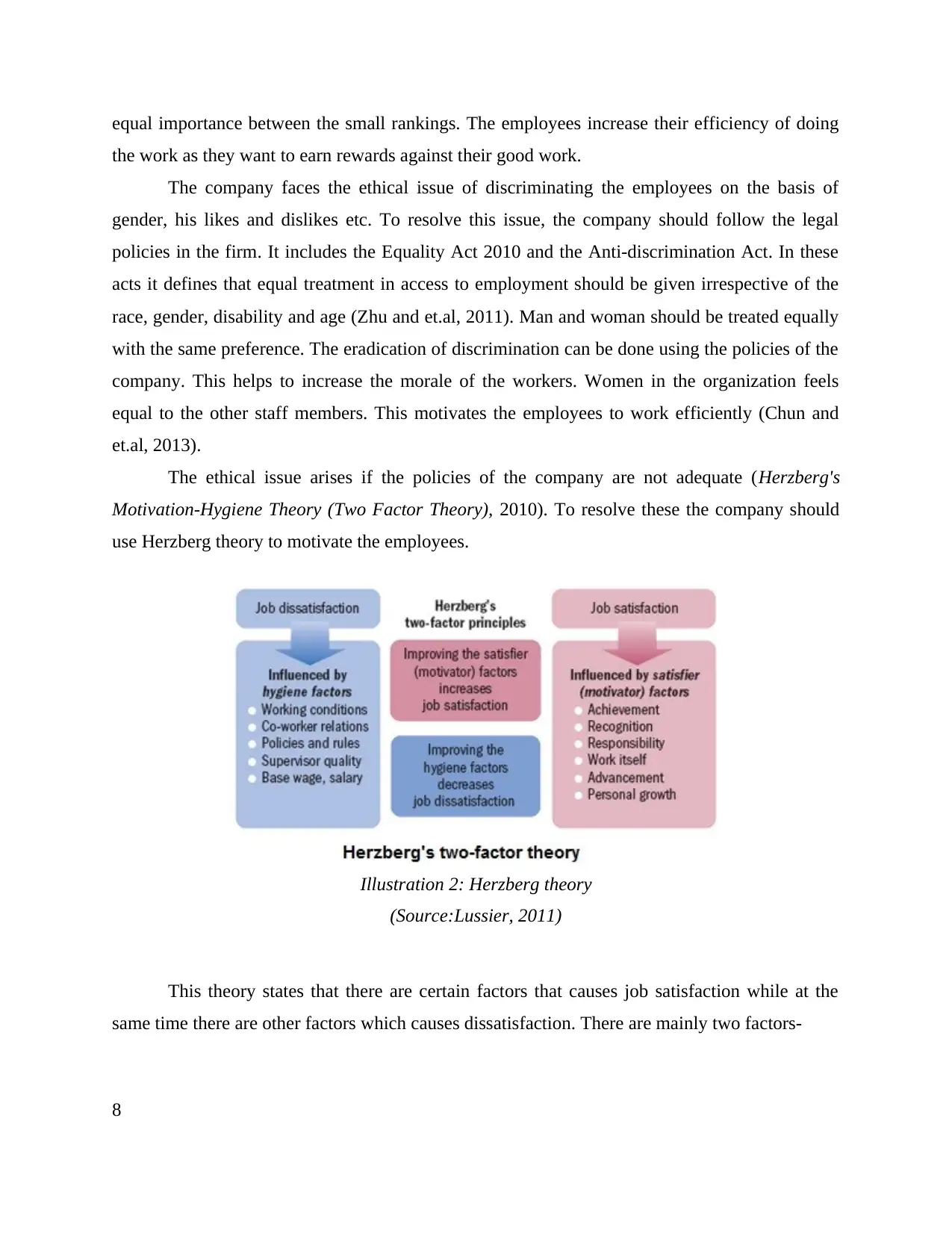
equal importance between the small rankings. The employees increase their efficiency of doing
the work as they want to earn rewards against their good work.
The company faces the ethical issue of discriminating the employees on the basis of
gender, his likes and dislikes etc. To resolve this issue, the company should follow the legal
policies in the firm. It includes the Equality Act 2010 and the Anti-discrimination Act. In these
acts it defines that equal treatment in access to employment should be given irrespective of the
race, gender, disability and age (Zhu and et.al, 2011). Man and woman should be treated equally
with the same preference. The eradication of discrimination can be done using the policies of the
company. This helps to increase the morale of the workers. Women in the organization feels
equal to the other staff members. This motivates the employees to work efficiently (Chun and
et.al, 2013).
The ethical issue arises if the policies of the company are not adequate (Herzberg's
Motivation-Hygiene Theory (Two Factor Theory), 2010). To resolve these the company should
use Herzberg theory to motivate the employees.
This theory states that there are certain factors that causes job satisfaction while at the
same time there are other factors which causes dissatisfaction. There are mainly two factors-
8
Illustration 2: Herzberg theory
(Source:Lussier, 2011)
the work as they want to earn rewards against their good work.
The company faces the ethical issue of discriminating the employees on the basis of
gender, his likes and dislikes etc. To resolve this issue, the company should follow the legal
policies in the firm. It includes the Equality Act 2010 and the Anti-discrimination Act. In these
acts it defines that equal treatment in access to employment should be given irrespective of the
race, gender, disability and age (Zhu and et.al, 2011). Man and woman should be treated equally
with the same preference. The eradication of discrimination can be done using the policies of the
company. This helps to increase the morale of the workers. Women in the organization feels
equal to the other staff members. This motivates the employees to work efficiently (Chun and
et.al, 2013).
The ethical issue arises if the policies of the company are not adequate (Herzberg's
Motivation-Hygiene Theory (Two Factor Theory), 2010). To resolve these the company should
use Herzberg theory to motivate the employees.
This theory states that there are certain factors that causes job satisfaction while at the
same time there are other factors which causes dissatisfaction. There are mainly two factors-
8
Illustration 2: Herzberg theory
(Source:Lussier, 2011)
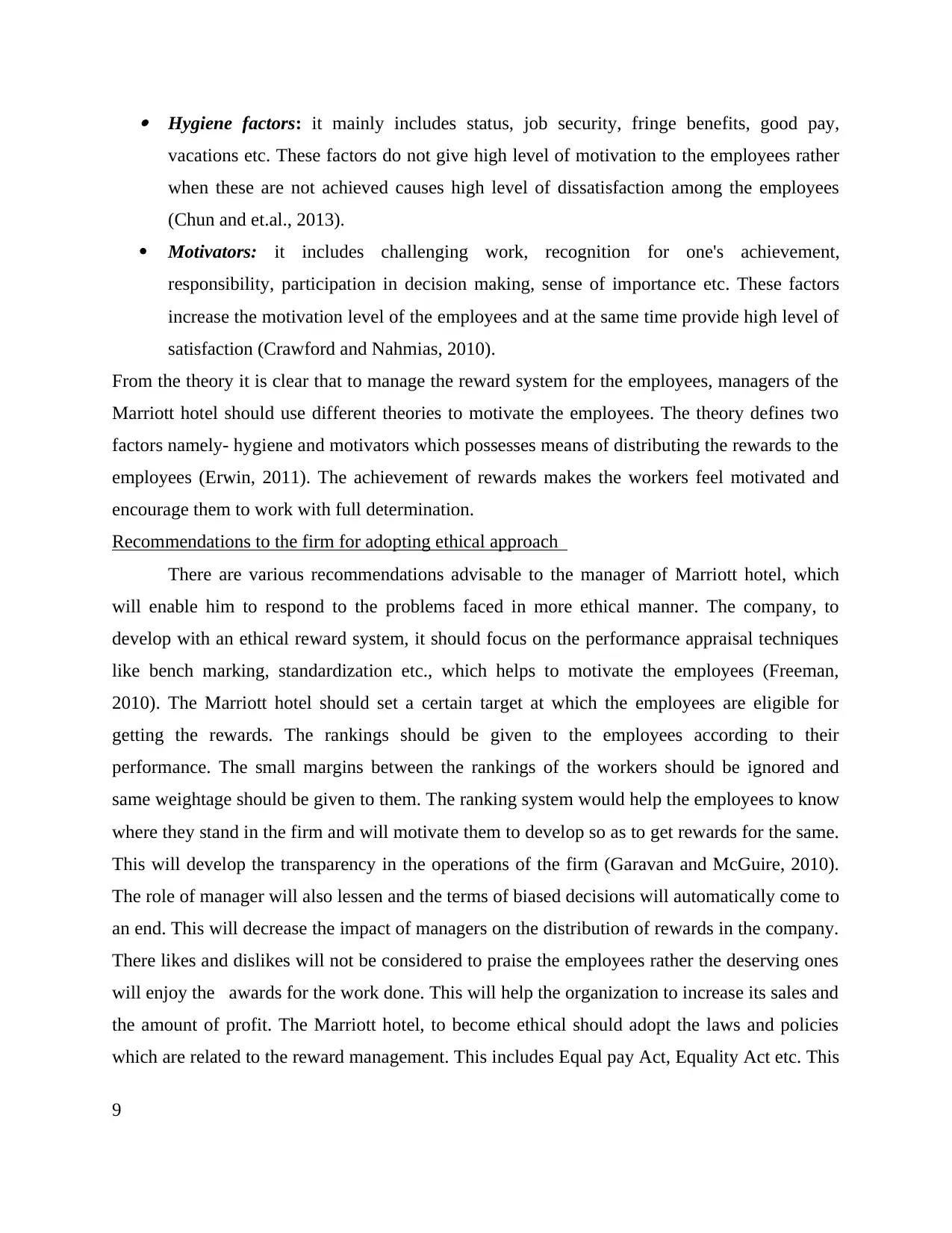
Hygiene factors: it mainly includes status, job security, fringe benefits, good pay,
vacations etc. These factors do not give high level of motivation to the employees rather
when these are not achieved causes high level of dissatisfaction among the employees
(Chun and et.al., 2013).
Motivators: it includes challenging work, recognition for one's achievement,
responsibility, participation in decision making, sense of importance etc. These factors
increase the motivation level of the employees and at the same time provide high level of
satisfaction (Crawford and Nahmias, 2010).
From the theory it is clear that to manage the reward system for the employees, managers of the
Marriott hotel should use different theories to motivate the employees. The theory defines two
factors namely- hygiene and motivators which possesses means of distributing the rewards to the
employees (Erwin, 2011). The achievement of rewards makes the workers feel motivated and
encourage them to work with full determination.
Recommendations to the firm for adopting ethical approach
There are various recommendations advisable to the manager of Marriott hotel, which
will enable him to respond to the problems faced in more ethical manner. The company, to
develop with an ethical reward system, it should focus on the performance appraisal techniques
like bench marking, standardization etc., which helps to motivate the employees (Freeman,
2010). The Marriott hotel should set a certain target at which the employees are eligible for
getting the rewards. The rankings should be given to the employees according to their
performance. The small margins between the rankings of the workers should be ignored and
same weightage should be given to them. The ranking system would help the employees to know
where they stand in the firm and will motivate them to develop so as to get rewards for the same.
This will develop the transparency in the operations of the firm (Garavan and McGuire, 2010).
The role of manager will also lessen and the terms of biased decisions will automatically come to
an end. This will decrease the impact of managers on the distribution of rewards in the company.
There likes and dislikes will not be considered to praise the employees rather the deserving ones
will enjoy the awards for the work done. This will help the organization to increase its sales and
the amount of profit. The Marriott hotel, to become ethical should adopt the laws and policies
which are related to the reward management. This includes Equal pay Act, Equality Act etc. This
9
vacations etc. These factors do not give high level of motivation to the employees rather
when these are not achieved causes high level of dissatisfaction among the employees
(Chun and et.al., 2013).
Motivators: it includes challenging work, recognition for one's achievement,
responsibility, participation in decision making, sense of importance etc. These factors
increase the motivation level of the employees and at the same time provide high level of
satisfaction (Crawford and Nahmias, 2010).
From the theory it is clear that to manage the reward system for the employees, managers of the
Marriott hotel should use different theories to motivate the employees. The theory defines two
factors namely- hygiene and motivators which possesses means of distributing the rewards to the
employees (Erwin, 2011). The achievement of rewards makes the workers feel motivated and
encourage them to work with full determination.
Recommendations to the firm for adopting ethical approach
There are various recommendations advisable to the manager of Marriott hotel, which
will enable him to respond to the problems faced in more ethical manner. The company, to
develop with an ethical reward system, it should focus on the performance appraisal techniques
like bench marking, standardization etc., which helps to motivate the employees (Freeman,
2010). The Marriott hotel should set a certain target at which the employees are eligible for
getting the rewards. The rankings should be given to the employees according to their
performance. The small margins between the rankings of the workers should be ignored and
same weightage should be given to them. The ranking system would help the employees to know
where they stand in the firm and will motivate them to develop so as to get rewards for the same.
This will develop the transparency in the operations of the firm (Garavan and McGuire, 2010).
The role of manager will also lessen and the terms of biased decisions will automatically come to
an end. This will decrease the impact of managers on the distribution of rewards in the company.
There likes and dislikes will not be considered to praise the employees rather the deserving ones
will enjoy the awards for the work done. This will help the organization to increase its sales and
the amount of profit. The Marriott hotel, to become ethical should adopt the laws and policies
which are related to the reward management. This includes Equal pay Act, Equality Act etc. This
9
⊘ This is a preview!⊘
Do you want full access?
Subscribe today to unlock all pages.

Trusted by 1+ million students worldwide
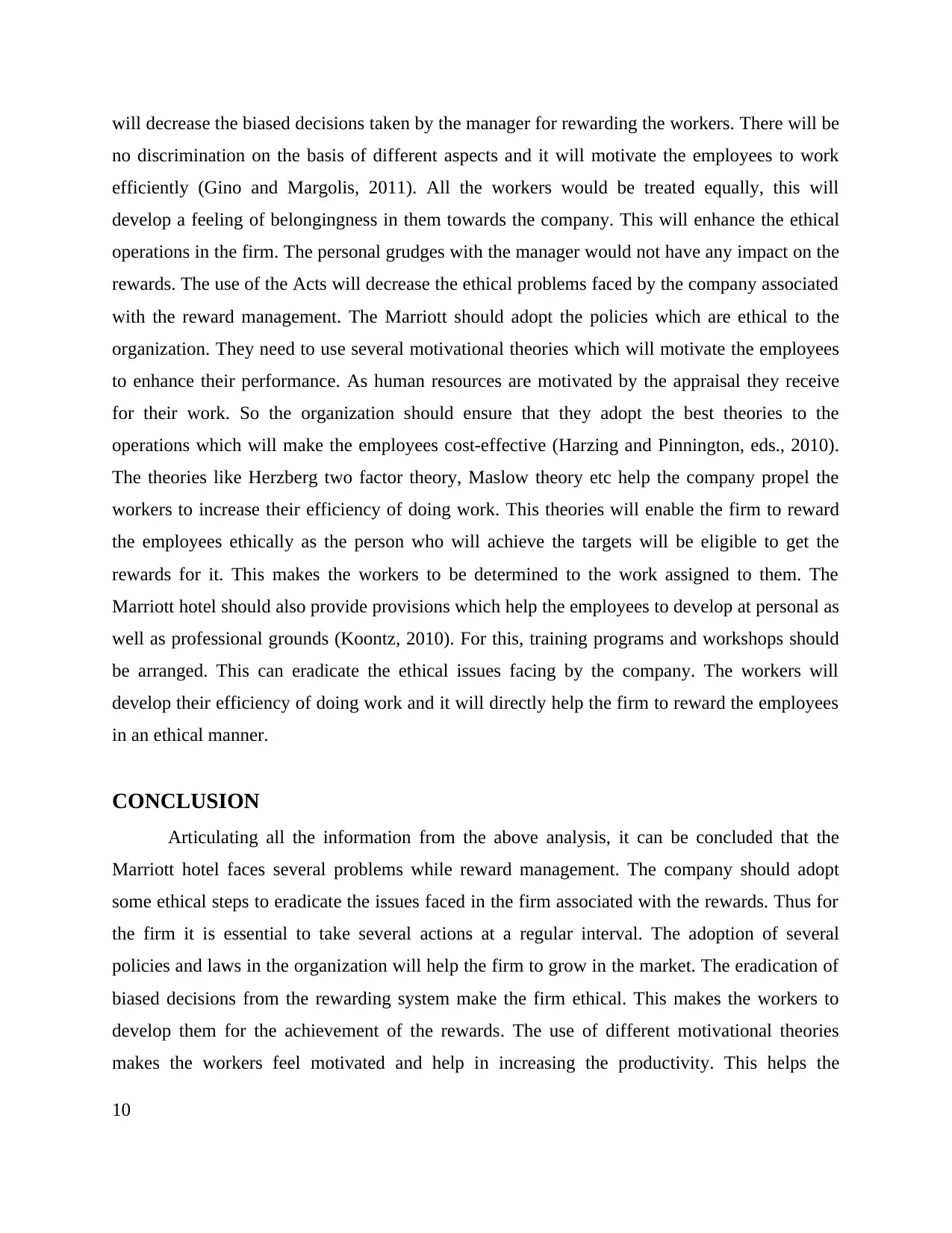
will decrease the biased decisions taken by the manager for rewarding the workers. There will be
no discrimination on the basis of different aspects and it will motivate the employees to work
efficiently (Gino and Margolis, 2011). All the workers would be treated equally, this will
develop a feeling of belongingness in them towards the company. This will enhance the ethical
operations in the firm. The personal grudges with the manager would not have any impact on the
rewards. The use of the Acts will decrease the ethical problems faced by the company associated
with the reward management. The Marriott should adopt the policies which are ethical to the
organization. They need to use several motivational theories which will motivate the employees
to enhance their performance. As human resources are motivated by the appraisal they receive
for their work. So the organization should ensure that they adopt the best theories to the
operations which will make the employees cost-effective (Harzing and Pinnington, eds., 2010).
The theories like Herzberg two factor theory, Maslow theory etc help the company propel the
workers to increase their efficiency of doing work. This theories will enable the firm to reward
the employees ethically as the person who will achieve the targets will be eligible to get the
rewards for it. This makes the workers to be determined to the work assigned to them. The
Marriott hotel should also provide provisions which help the employees to develop at personal as
well as professional grounds (Koontz, 2010). For this, training programs and workshops should
be arranged. This can eradicate the ethical issues facing by the company. The workers will
develop their efficiency of doing work and it will directly help the firm to reward the employees
in an ethical manner.
CONCLUSION
Articulating all the information from the above analysis, it can be concluded that the
Marriott hotel faces several problems while reward management. The company should adopt
some ethical steps to eradicate the issues faced in the firm associated with the rewards. Thus for
the firm it is essential to take several actions at a regular interval. The adoption of several
policies and laws in the organization will help the firm to grow in the market. The eradication of
biased decisions from the rewarding system make the firm ethical. This makes the workers to
develop them for the achievement of the rewards. The use of different motivational theories
makes the workers feel motivated and help in increasing the productivity. This helps the
10
no discrimination on the basis of different aspects and it will motivate the employees to work
efficiently (Gino and Margolis, 2011). All the workers would be treated equally, this will
develop a feeling of belongingness in them towards the company. This will enhance the ethical
operations in the firm. The personal grudges with the manager would not have any impact on the
rewards. The use of the Acts will decrease the ethical problems faced by the company associated
with the reward management. The Marriott should adopt the policies which are ethical to the
organization. They need to use several motivational theories which will motivate the employees
to enhance their performance. As human resources are motivated by the appraisal they receive
for their work. So the organization should ensure that they adopt the best theories to the
operations which will make the employees cost-effective (Harzing and Pinnington, eds., 2010).
The theories like Herzberg two factor theory, Maslow theory etc help the company propel the
workers to increase their efficiency of doing work. This theories will enable the firm to reward
the employees ethically as the person who will achieve the targets will be eligible to get the
rewards for it. This makes the workers to be determined to the work assigned to them. The
Marriott hotel should also provide provisions which help the employees to develop at personal as
well as professional grounds (Koontz, 2010). For this, training programs and workshops should
be arranged. This can eradicate the ethical issues facing by the company. The workers will
develop their efficiency of doing work and it will directly help the firm to reward the employees
in an ethical manner.
CONCLUSION
Articulating all the information from the above analysis, it can be concluded that the
Marriott hotel faces several problems while reward management. The company should adopt
some ethical steps to eradicate the issues faced in the firm associated with the rewards. Thus for
the firm it is essential to take several actions at a regular interval. The adoption of several
policies and laws in the organization will help the firm to grow in the market. The eradication of
biased decisions from the rewarding system make the firm ethical. This makes the workers to
develop them for the achievement of the rewards. The use of different motivational theories
makes the workers feel motivated and help in increasing the productivity. This helps the
10
Paraphrase This Document
Need a fresh take? Get an instant paraphrase of this document with our AI Paraphraser
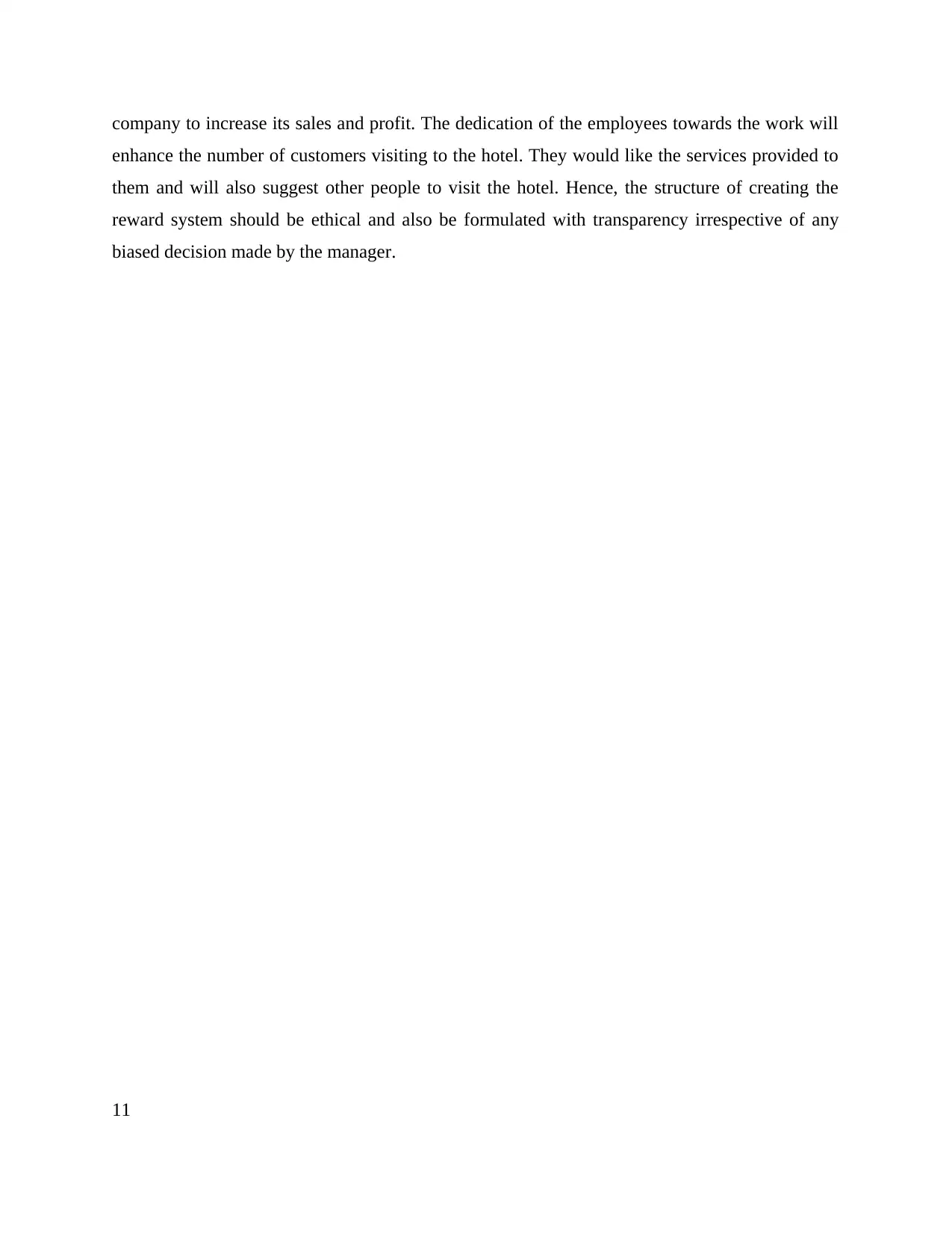
company to increase its sales and profit. The dedication of the employees towards the work will
enhance the number of customers visiting to the hotel. They would like the services provided to
them and will also suggest other people to visit the hotel. Hence, the structure of creating the
reward system should be ethical and also be formulated with transparency irrespective of any
biased decision made by the manager.
11
enhance the number of customers visiting to the hotel. They would like the services provided to
them and will also suggest other people to visit the hotel. Hence, the structure of creating the
reward system should be ethical and also be formulated with transparency irrespective of any
biased decision made by the manager.
11
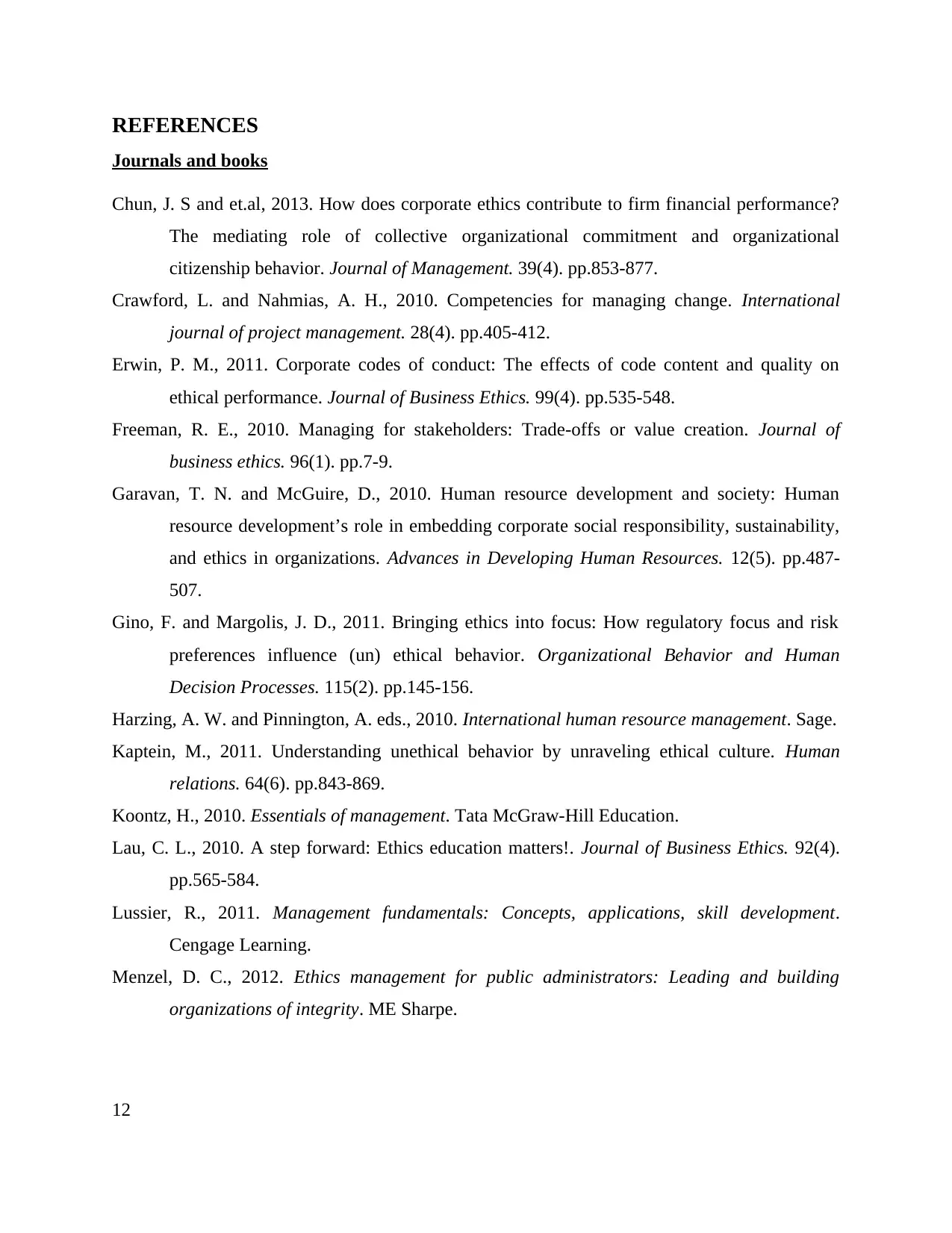
REFERENCES
Journals and books
Chun, J. S and et.al, 2013. How does corporate ethics contribute to firm financial performance?
The mediating role of collective organizational commitment and organizational
citizenship behavior. Journal of Management. 39(4). pp.853-877.
Crawford, L. and Nahmias, A. H., 2010. Competencies for managing change. International
journal of project management. 28(4). pp.405-412.
Erwin, P. M., 2011. Corporate codes of conduct: The effects of code content and quality on
ethical performance. Journal of Business Ethics. 99(4). pp.535-548.
Freeman, R. E., 2010. Managing for stakeholders: Trade-offs or value creation. Journal of
business ethics. 96(1). pp.7-9.
Garavan, T. N. and McGuire, D., 2010. Human resource development and society: Human
resource development’s role in embedding corporate social responsibility, sustainability,
and ethics in organizations. Advances in Developing Human Resources. 12(5). pp.487-
507.
Gino, F. and Margolis, J. D., 2011. Bringing ethics into focus: How regulatory focus and risk
preferences influence (un) ethical behavior. Organizational Behavior and Human
Decision Processes. 115(2). pp.145-156.
Harzing, A. W. and Pinnington, A. eds., 2010. International human resource management. Sage.
Kaptein, M., 2011. Understanding unethical behavior by unraveling ethical culture. Human
relations. 64(6). pp.843-869.
Koontz, H., 2010. Essentials of management. Tata McGraw-Hill Education.
Lau, C. L., 2010. A step forward: Ethics education matters!. Journal of Business Ethics. 92(4).
pp.565-584.
Lussier, R., 2011. Management fundamentals: Concepts, applications, skill development.
Cengage Learning.
Menzel, D. C., 2012. Ethics management for public administrators: Leading and building
organizations of integrity. ME Sharpe.
12
Journals and books
Chun, J. S and et.al, 2013. How does corporate ethics contribute to firm financial performance?
The mediating role of collective organizational commitment and organizational
citizenship behavior. Journal of Management. 39(4). pp.853-877.
Crawford, L. and Nahmias, A. H., 2010. Competencies for managing change. International
journal of project management. 28(4). pp.405-412.
Erwin, P. M., 2011. Corporate codes of conduct: The effects of code content and quality on
ethical performance. Journal of Business Ethics. 99(4). pp.535-548.
Freeman, R. E., 2010. Managing for stakeholders: Trade-offs or value creation. Journal of
business ethics. 96(1). pp.7-9.
Garavan, T. N. and McGuire, D., 2010. Human resource development and society: Human
resource development’s role in embedding corporate social responsibility, sustainability,
and ethics in organizations. Advances in Developing Human Resources. 12(5). pp.487-
507.
Gino, F. and Margolis, J. D., 2011. Bringing ethics into focus: How regulatory focus and risk
preferences influence (un) ethical behavior. Organizational Behavior and Human
Decision Processes. 115(2). pp.145-156.
Harzing, A. W. and Pinnington, A. eds., 2010. International human resource management. Sage.
Kaptein, M., 2011. Understanding unethical behavior by unraveling ethical culture. Human
relations. 64(6). pp.843-869.
Koontz, H., 2010. Essentials of management. Tata McGraw-Hill Education.
Lau, C. L., 2010. A step forward: Ethics education matters!. Journal of Business Ethics. 92(4).
pp.565-584.
Lussier, R., 2011. Management fundamentals: Concepts, applications, skill development.
Cengage Learning.
Menzel, D. C., 2012. Ethics management for public administrators: Leading and building
organizations of integrity. ME Sharpe.
12
⊘ This is a preview!⊘
Do you want full access?
Subscribe today to unlock all pages.

Trusted by 1+ million students worldwide
1 out of 13
Related Documents
Your All-in-One AI-Powered Toolkit for Academic Success.
+13062052269
info@desklib.com
Available 24*7 on WhatsApp / Email
![[object Object]](/_next/static/media/star-bottom.7253800d.svg)
Unlock your academic potential
Copyright © 2020–2025 A2Z Services. All Rights Reserved. Developed and managed by ZUCOL.





